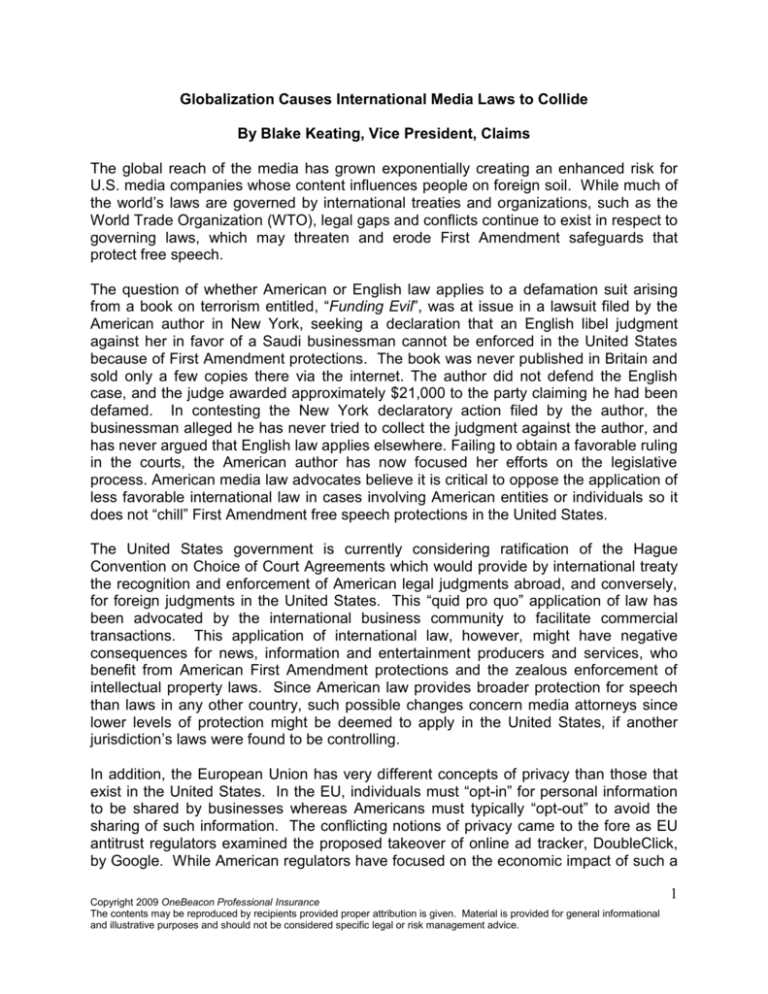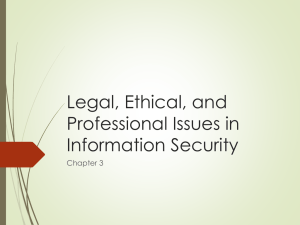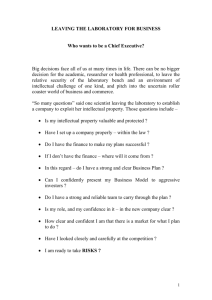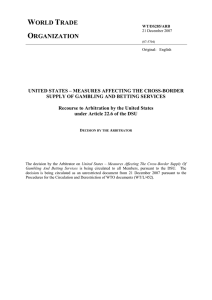Globalization Causes Conflicting International Media Laws to Collide
advertisement

Globalization Causes International Media Laws to Collide By Blake Keating, Vice President, Claims The global reach of the media has grown exponentially creating an enhanced risk for U.S. media companies whose content influences people on foreign soil. While much of the world’s laws are governed by international treaties and organizations, such as the World Trade Organization (WTO), legal gaps and conflicts continue to exist in respect to governing laws, which may threaten and erode First Amendment safeguards that protect free speech. The question of whether American or English law applies to a defamation suit arising from a book on terrorism entitled, “Funding Evil”, was at issue in a lawsuit filed by the American author in New York, seeking a declaration that an English libel judgment against her in favor of a Saudi businessman cannot be enforced in the United States because of First Amendment protections. The book was never published in Britain and sold only a few copies there via the internet. The author did not defend the English case, and the judge awarded approximately $21,000 to the party claiming he had been defamed. In contesting the New York declaratory action filed by the author, the businessman alleged he has never tried to collect the judgment against the author, and has never argued that English law applies elsewhere. Failing to obtain a favorable ruling in the courts, the American author has now focused her efforts on the legislative process. American media law advocates believe it is critical to oppose the application of less favorable international law in cases involving American entities or individuals so it does not “chill” First Amendment free speech protections in the United States. The United States government is currently considering ratification of the Hague Convention on Choice of Court Agreements which would provide by international treaty the recognition and enforcement of American legal judgments abroad, and conversely, for foreign judgments in the United States. This “quid pro quo” application of law has been advocated by the international business community to facilitate commercial transactions. This application of international law, however, might have negative consequences for news, information and entertainment producers and services, who benefit from American First Amendment protections and the zealous enforcement of intellectual property laws. Since American law provides broader protection for speech than laws in any other country, such possible changes concern media attorneys since lower levels of protection might be deemed to apply in the United States, if another jurisdiction’s laws were found to be controlling. In addition, the European Union has very different concepts of privacy than those that exist in the United States. In the EU, individuals must “opt-in” for personal information to be shared by businesses whereas Americans must typically “opt-out” to avoid the sharing of such information. The conflicting notions of privacy came to the fore as EU antitrust regulators examined the proposed takeover of online ad tracker, DoubleClick, by Google. While American regulators have focused on the economic impact of such a Copyright 2009 OneBeacon Professional Insurance The contents may be reproduced by recipients provided proper attribution is given. Material is provided for general informational and illustrative purposes and should not be considered specific legal or risk management advice. 1 merger, the EU officials focused on privacy and the potential monopolistic control that Google might have over internet advertising and access to personal information. Google places ads on web pages that targeted consumers are likely to use and believes its internet advertising business will expand greatly by utilizing DoubleClick’s tracking mechanisms. In an age when governments collect personal information to thwart terrorist activities, and on the heels of a recent British government admission that it had lost two computer disks with addresses, bank accounts and other personal information of about 25 million people, questions about the ownership, maintenance and access of personal data and privacy concerns of consumers have taken on renewed importance. In China, which has just overtaken the United States as the nation with the most internet users, new restrictions are being imposed on the media and on businesses seeking to do business in this fast growing economic behemoth with a population of 1.3 billion people. Yahoo recently gained notoriety by helping the Chinese state police uncover the internet identities of two Chinese journalists who have now been sentenced to ten years in prison for disseminating pro-democracy writings, thereby effectively suppressing any political dissent. China has also just announced restrictions on the broadcast of internet videos – including all video sharing web sites run by state controlled companies. While the majority of video producers in China are currently private, providers will be required to delete and report content that “hurts the reputation of China” or “disrupts social stability”. How these Chinese laws will be applied and how they will affect companies such as YouTube, which runs a Chinese language web site, is unclear at this early juncture. In a move highlighting China’s trade disputes with the United States, China recently stopped granting permission to show American films in its cinemas. The action was believed to be a response to the filing of a dispute on an intellectual property rights case with the World Trade Organization by the United States. That filing was intended to apply pressure on China to more strictly enforce intellectual property laws and to give American companies greater access to Chinese markets. It is believed that the move will be reversed after further discussions between the two countries. In another World Trade Organization matter, the small Caribbean nation of Antigua was awarded the right to legally violate copyright protections on software, films and music from the United States up to a value of $21 million as the resolution to a dispute between the two countries over online gambling. This unusual remedy was intended to encourage the United States to reach a trade agreement with Antigua, which has a booming online gambling industry - its second largest employer behind beach tourism. There is some concern that other countries might sue the United States for unfair trade practices and that electronic piracy may be encouraged due to the WTO ruling. The American trade representative issued a statement that Antigua should avoid piracy and counterfeiting while negotiations over the valuation of intellectual property proportionate to the $21 million award continue, lest Antigua’s stated intentions of becoming a leader in lawful electronic commerce become meaningless. It is expected that the United Copyright 2009 OneBeacon Professional Insurance The contents may be reproduced by recipients provided proper attribution is given. Material is provided for general informational and illustrative purposes and should not be considered specific legal or risk management advice. 2 States will fight hard on the issue of valuation to make sure Antigua doesn’t inappropriately discount the claimed value of intellectual property the U. S. believes should be valued at a higher dollar figure so as to unfairly violate copyrights of a value greater than the $21 million award. Intellectual property infringement remains a significant problem, especially in developing nations such as China and Antigua. It is estimated that all crime losses in the United States totaled $17 billion last year, but that intellectual property infringement in the U. S. alone last year cost its owners approximately $250 billion. There is great concern about piracy, lost profits, uncollected tax revenues and the loss of American jobs that result from intellectual property piracy. Intellectual property comprises a vast share of total U. S. exports to other countries. Even China, a country with previously notorious lax application of intellectual property law, is becoming more active in protecting content, especially content generated in China, which is growing steadily. Media content providers need to recognize the potential conflict of international laws concerning their work product and that they might be subject to a lawsuit in a jurisdiction other than the United States. Appropriate risk management in any given situation might dictate that a presumption that the least favorable foreign law might apply in a given situation, e.g., the downloading of online content in an unfavorable jurisdiction. Great care should be taken to confirm that any applicable media liability insurance provide coverage for claims that arise anywhere in the world. Copyright 2009 OneBeacon Professional Insurance The contents may be reproduced by recipients provided proper attribution is given. Material is provided for general informational and illustrative purposes and should not be considered specific legal or risk management advice. 3








